15 Dynamic Muslim Women We ALL Need to Know from the Past, Present & Future
Community
|
Mar 8, 2023
|
14 MIN READ
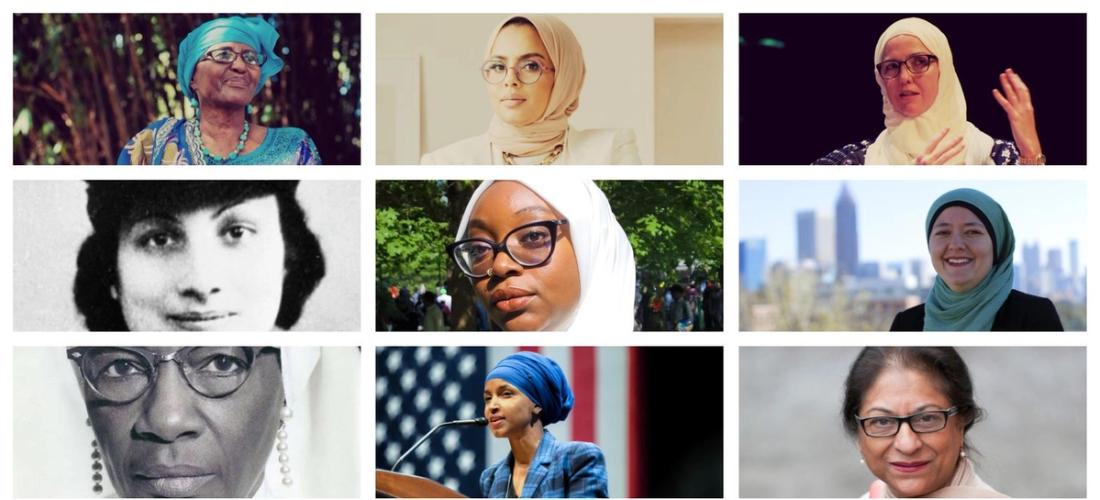
Educators, scientists, artists, religious leaders, journalists, leaders, community organizers, elected officials, activists and more. Muslim women’s contributions to all facets of our societies around the world knows no boundaries. Women’s History Month is an opportunity to celebrate the progress that has been made in advancing women’s rights while also recognizing the work that still needs to be done. It is a time to honor the achievements of women throughout history, as well as the women who are currently working to make the world a more equitable and just place for all.
The history of women’s struggle for equality is a long and complex one. Throughout history, women have faced discrimination, oppression and marginalization in many aspects of life, including education, employment, politics, and the law. It is important to acknowledge and honor the many women who have fought tirelessly to advance women’s rights and improve the lives of women around the world.
Muslim women's excellence is demonstrated in countless ways throughout history and in present times. They have broken barriers and shattered stereotypes to achieve greatness and inspired others to do the same. Muslim women have also shown remarkable resilience and strength in the face of adversity, whether it be through fighting for their rights or overcoming personal challenges.
Here are 15 notable Muslim women from the past and present who have made strides in their fields and in society. We are also including dynamic Muslim women to look out for in the future. We hope you get as much joy and learn as much as my editor Dilshad and I did in writing and researching about these wonderful sisters in Islam.
The Past: Notable Muslim Women in History
1. Sr. Clara Muhammad, Educator, Organizer
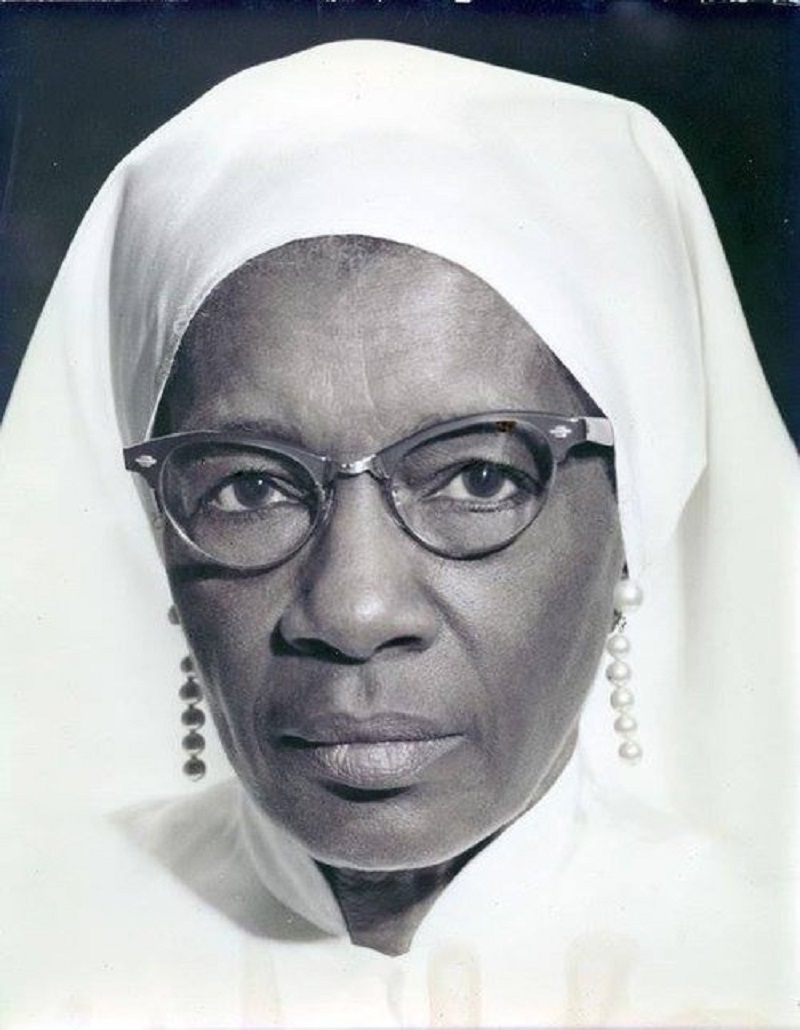
Image source: Tumblr
Sister Clara Muhammad – known as the first lady of the Nation of Islam, wife to Elijah Muhammad and mother of Imam Warith Dean Muhammad – was instrumental in the work of the NOI and the subsequent Sunni Muslim community that grew from that. She was instrumental in the immense growth of the NOI’s primary and secondary schools, of which the first classes were taught in Sister Clara’s home, and which were the first Islamic schools in the country.
As Professor Jamillah Karim writes in this article for Sapelo Square, Imam Warith Dean Muhammad’s pro-women philosophy as he transitioned to Sunni Islam came from his appreciation for his mother’s work: “He used the concept of “mother” to discuss women’s roles. In doing so, he honored another one of Clara Muhammad’s important contributions, especially in the eyes of Nation women, referred to as MGT. Clara Muhammad served as the exemplar of feminine virtues instilled in MGT, short for Muslim Girls Training and General Civilization Class. The imam, however, rejected the MGT’s narrow focus on the domestic realm and celebrated women’s unique capacity and insights as mothers in a scope beyond the home, captured in his term ‘mothers to society.’” (Dilshad D. Ali)
2. Fatima Al-Fihri, Founder
Did you know that one of the oldest universities in the world was founded by a Muslim woman? Fatima Al-Fihri, known as Umm al-Banin or the “Mother of the Children,” is credited with founding the al-Qarawiyyin Mosque around 857 AD in Fez, Morocco. Fatima’s family migrated to Fez from Kairouan. Her father left his wealth to Fatima and her sister Maryam, who were both well educated and studied Islamic jurisprudence, fiqh and hadith. The mosque she founded developed into a teaching institution, which then in 1963 became the modern University of Al-Qarawiyyin. According to this article, the university is credited with playing a “crucial role in the cultural exchange and transfer of knowledge between Muslims and Europeans.” (DDA)
3. Dynamic Sahabiyyat of the Prophet Muhammad (saw)
Islamic history is filled with wonderful stories about the companions of the Prophet Muhammad (saw) and how they worked to support the Prophet (saw) in spreading the message of Islam. Many dynamic sahabiyyat (female companions of the Prophet) also broke barriers and gave everything of themselves in support of Islam. Nusayba bint Ka’ab (ra), for example, tore down assumptions about gender and faith. An Ansaar convert and one of two women present at the second pledge at Al-Aqabah, Nusaybah (ra) was a wife, mother, diplomat and defender of the Prophet Muhammad (saw). During the Battle of Uhud, she astonished people with her swordsmanship and protected the Messenger (saw) with her husband and two sons.
Another sahabiyya, Al Khansa (ra) was a poet known for her honor, beauty and fame. She was famous for her eulogies about her two brothers, who had passed. The Prophet Muhammad (saw) was struck by the beauty of her words and encouraged her to recite her poetry. Long after the passing of the Prophet (saw), it was during the reign of Umar (ra) that Al Khansa (ra) and her four sons headed out with the Muslim army to Iraq in the battle of Al Qadissiyah, where all four of her sons were martyred.
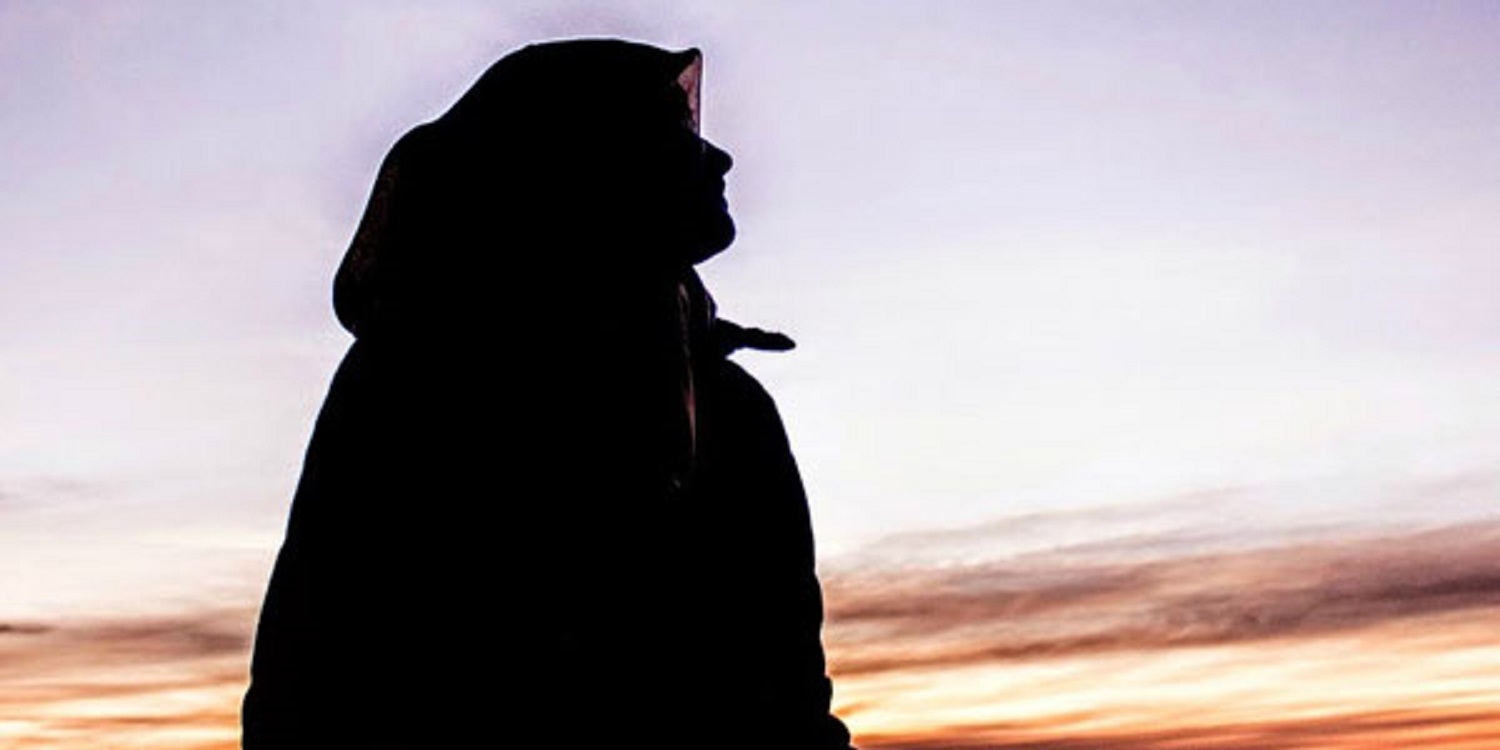
Image source: Pixabay
Rufaida Al-Aslamiya (ra) was another companion of the Prophet (saw) whose medical work impacted healthcare and social work. She is widely recognized as one of the earliest nurses and cared for injured soldiers during the battles with Makkan tribes, including the Battle of Al Khandaq and the Battle of Khaibar.
And we also can’t forget Asma Bint Abi Bakr (ra), who epitomized the great strength, protection and sacrifice mothers offer. She was the daughter of Abu Bakr Al Siddiq (ra) and accepted Islam at the tender age of 11. She narrated a plethora of hadith on behalf of Aisha (ra) and the Prophet Muhammad (saw) and provided food to her father and the Prophet (saw) when she was heavily pregnant and they were hiding in the place of Ghar (cave) Thawr during their migration to Madinah. There are so many stories about her like this, offering protection and shelter during the hardest of times. (DDA)
4. Noor Inayat Khan, WWII British War Hero
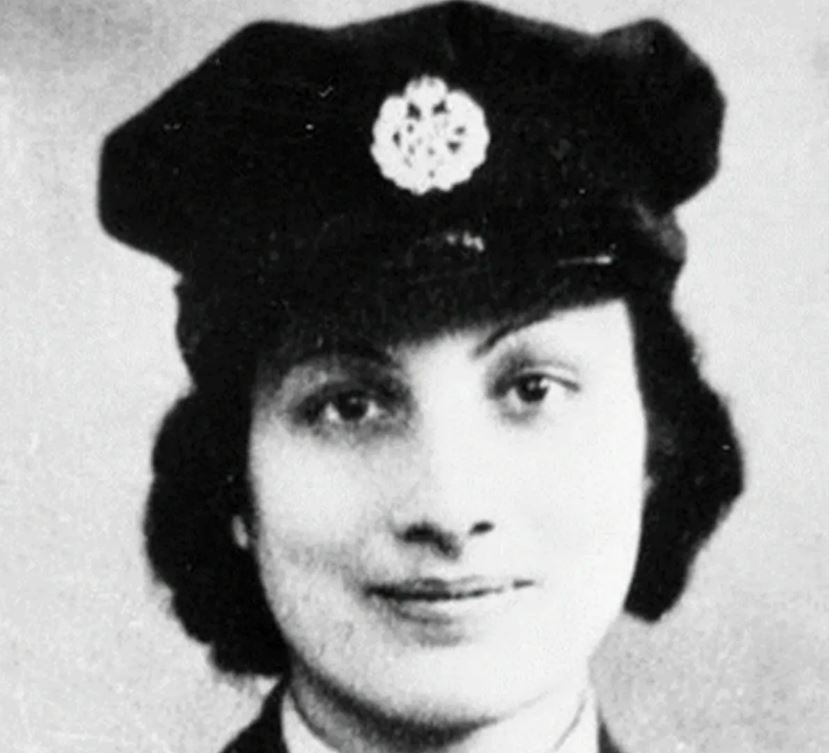
Image source: Wikimedia Commons
Noor Inayat Khan was a British spy who worked for the Special Operations Executive (SOE) during World War II and became the first female wireless operator to be sent to Nazi-occupied France. She was born in Moscow in 1914 to an Indian father and an American mother and was raised in France. Noor was a gifted musician and author who wrote children's stories and was interested in Sufi mysticism.
During the war, Noor was recruited by the SOE and trained as a wireless operator. She was sent to France in June 1943 and spent several months operating undercover, transmitting messages and organizing resistance activities. She worked under hazardous conditions, constantly evading Nazi detection, but was eventually betrayed by a French collaborator and arrested. Noor was imprisoned and interrogated but refused to provide information to her captors. She was executed at the Dachau concentration camp in 1944 at the age of 30.
Noor Inayat Khan's bravery and sacrifice have made her a symbol of heroism during World War II. She was posthumously awarded the George Cross and the Croix de Guerre; in 2012, a memorial was erected in her honor in London. Khan's legacy continues to inspire people today, particularly women and minorities, as a reminder of the strength and courage of those who fight against oppression and injustice. (Layla Abdullah-Poulos)
5. Sameera Moussa, Nuclear Scientist
Muslim women have made so many contributions to the fields of science and technology. For example, Sameera Moussa was the first female Egyptian nuclear scientist and first woman to earn a doctorate in atomic radiation from Cairo University. She made numerous contributions to the field of nuclear science. Sameera, who passed away in 1957, came to the United States on a Fulbright scholarship and was the first noncitizen to tour American atomic energy facilities.
According to this article, she believed that “medical use of nuclear technology was the wave of the future, and she wanted to make it accessible. She famously said, ‘I’ll make nuclear treatment as available and as cheap as aspirin.’ But she wanted to protect against nuclear hazards, too. So she organized the International Atomic Energy for Peace Conference and invited prominent scientists to brainstorm solutions.” (DDA)
6. Hawa Abdi, Human Rights Activist and Physician
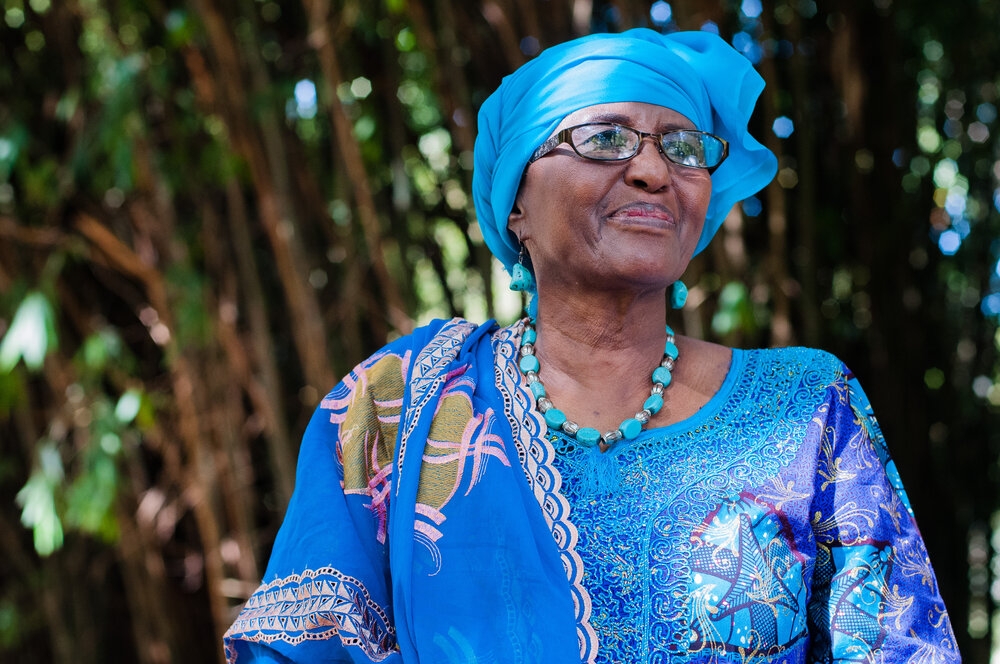
Image source: Dr. Hawa Abdi Foundation
Dr. Hawa Abdi, who recently passed away in 2020, was a Somali human rights activist and physician who dedicated her life to improving the lives of marginalized communities in Somalia, particularly women and children. She was born in 1947 in the Lower Shabelle region of Somalia and studied medicine in the former Soviet Union. In 1983, Dr. Abdi founded the Rural Health Development Organization (RHDO), a non-profit organization that provides medical care, education, and other services to rural communities in Somalia.
During the civil war in Somalia in the 1990s, Dr. Abdi's organization provided vital medical and humanitarian assistance to those affected by the conflict. She also established a camp on her family's farm outside of Mogadishu, which provided shelter, food and other assistance to thousands of people who had been forced to flee their homes. Dr. Abdi and her daughters, who are also physicians, provided medical care to those in need, often putting themselves at great risk in the process. Despite threats from armed groups and a lack of resources, Hawa remained committed to her work and continued to provide lifesaving care to those who needed it most. (LA)
The Present: Muslim Women Doing Big Things
7. Tawakkol Kamran, Journalist and Nobel Peace Prize Winner
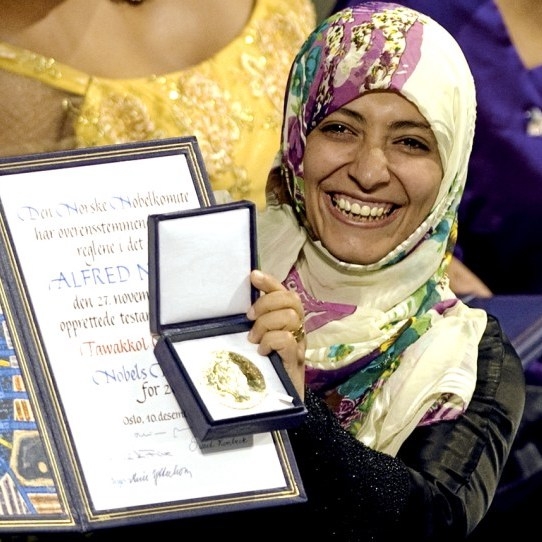
Image source: Wikimedia Commons
Tawakkol Karman is a Yemeni journalist and activist who was awarded the Nobel Peace Prize in 2011 for her efforts to promote women's rights and democratic change in Yemen. Karman is known as the "Mother of the Revolution" for her leadership in the 2011 Yemeni uprising against President Ali Abdullah Saleh. She co-founded the organization Women Journalists Without Chains, which advocates for human rights and freedom of the press in Yemen.
Karman began her career as a journalist and worked for several newspapers and news agencies in Yemen. In 2005, she co-founded the organization Women Journalists Without Chains (WJWC), which advocates for freedom of the press and women's rights in Yemen. Karman used her platform as a journalist to expose human rights abuses and political corruption in Yemen, despite facing harassment and intimidation from the government.
Karman has been an outspoken critic of the Yemeni government's treatment of women and has advocated for greater political representation for women in Yemeni society. Despite facing harassment and imprisonment for her activism, Karman has continued to work tirelessly to promote peace, democracy, and human rights in Yemen and around the world. She is a powerful example of the courage and determination of women who are fighting for justice and equality in the face of adversity. (LA)
8. Dr. Ingrid Mattson, Islamic Scholar and Religious Leader
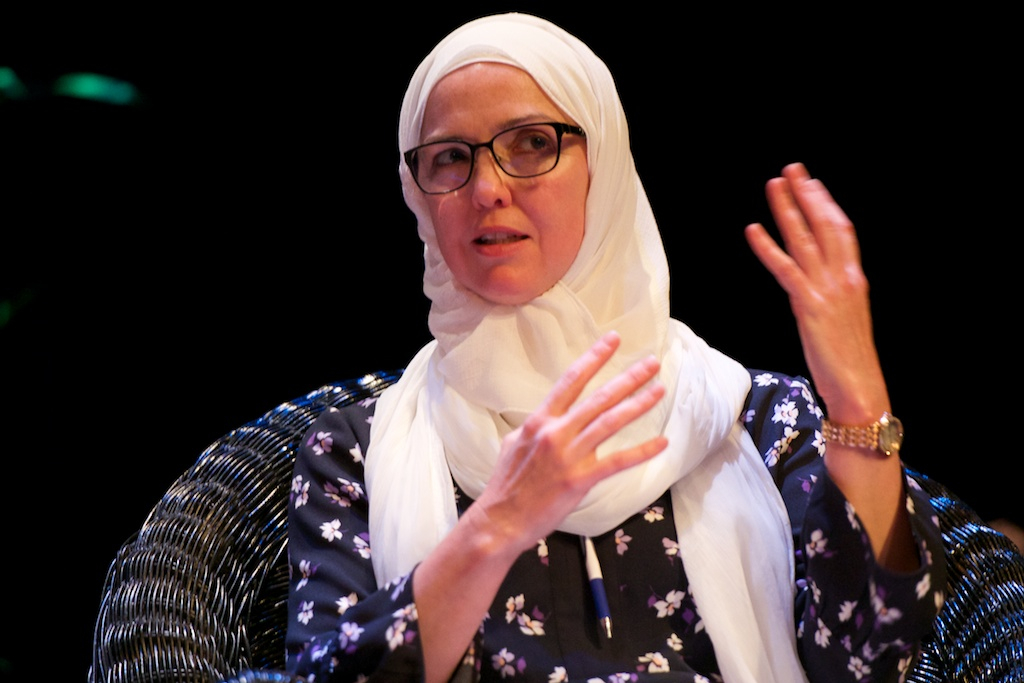
Image source: Flickr
Dr. Ingrid Mattson is a Canadian scholar and religious leader who has been at the forefront of promoting interfaith dialogue and understanding. She was born in 1963 in Ontario, Canada and converted to Islam in the late 1970s. Mattson earned a Ph.D. in Islamic studies from the University of Chicago and has taught at several universities in the United States and Canada.
Dr. Mattson served as the president of the Islamic Society of North America (ISNA) from 2006 to 2010, becoming the first woman and the first convert to hold the position. As president of ISNA, Mattson worked to promote interfaith dialogue and understanding, and to combat Islamophobia and religious discrimination. She has also been an advocate for women's rights within the Muslim community. Dr. Mattson founded The Hurma Project, an educational organization that provides resources, research and support to address layers of abuse in Muslim spaces, including mosques, Islamic centers and Islamic schools.
In addition to her work as a religious leader, Dr. Mattson is also a prolific writer and scholar. She has written several books and articles on Islam and interfaith relations, including "The Story of the Qur'an" and "Muslims and the Making of America." Mattson's scholarship has been widely recognized, and she has received numerous awards and honors for her contributions to interfaith dialogue and understanding.
Through her leadership and scholarship, Ingrid Mattson has been a powerful voice for interfaith dialogue, religious tolerance, and women's rights. Her work has helped to break down barriers and foster greater understanding and respect between different faith communities, and she continues to inspire others to work towards a more peaceful and just world. (LA)
9. Asma Jahangir, Lawyer and Human Rights Activist
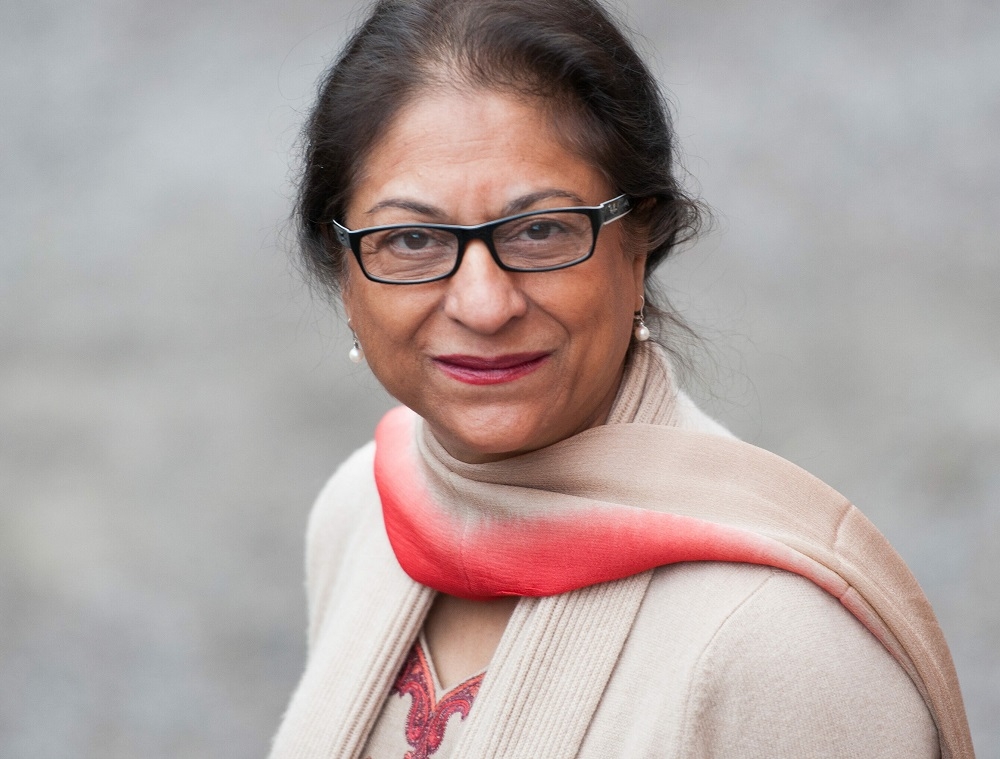
Image source: Facebook; photo by Wolfgang Schmidt
Asma Jahangir is a Pakistani lawyer and human rights activist who is a leading voice for democracy, gender equality, and religious freedom in Pakistan and worldwide. She was born in Lahore, Pakistan in 1952 and studied law at the Punjab University before becoming a prominent human rights lawyer in Pakistan.
Throughout her career, Asma has worked tirelessly to defend the rights of marginalized and vulnerable communities in Pakistan, including women and religious minorities and other marginalized communities. She is a vocal critic of the Pakistani government's human rights record and is frequently targeted for her advocacy, facing arrest, imprisonment, and death threats. Asma also served as a United Nations Special Rapporteur on human rights and is a founding member of the Human Rights Commission of Pakistan and the Women's Action Forum.
Asma’s contributions to human rights and democracy in Pakistan are widely recognized nationally and internationally. She received numerous awards and honors for her work, including the French Legion of Honor, the Right Livelihood Award, and the Freedom Award from the International Rescue Committee. Asma’s legacy continues to inspire human rights advocates around the world, and her work serves as a reminder of the importance of speaking truth to power and standing up for the rights of all people, regardless of their background or identity. (LA)
10. Rashida Tlaib, U.S. House of Representatives (MI-D)
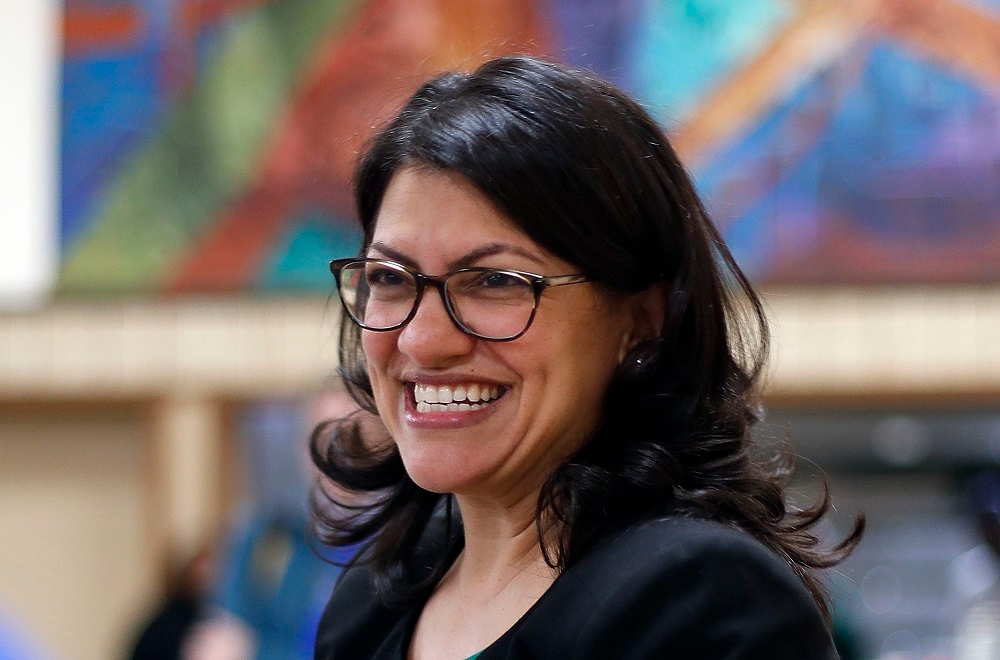
Image source: Twitter
Rashida Tlaib is an American politician and activist who has become a prominent voice for progressive causes and policies in the United States Congress. She was born in Detroit, Michigan in 1976 to Palestinian immigrant parents and grew up in a working-class family. Rashida began her career as a social worker and community organizer, working on affordable housing and immigrant rights issues.
In 2018, Rashida became the first Palestinian-American woman elected to the U.S. Congress, representing Michigan's 13th congressional district. Since taking office, she has been a vocal advocate for progressive policies such as Medicare for All, a Green New Deal, and criminal justice reform. Rashida has also been an outspoken critic of the Trump administration's policies on immigration and foreign affairs and has been a leading voice in the fight for Palestinian rights. Her election and subsequent advocacy have inspired a new generation of young people, particularly women and people of color, to engage in politics and work towards a more just and equitable society. (LA)
11. Ilhan Omar, U.S. House of Representatives, (MN-D)
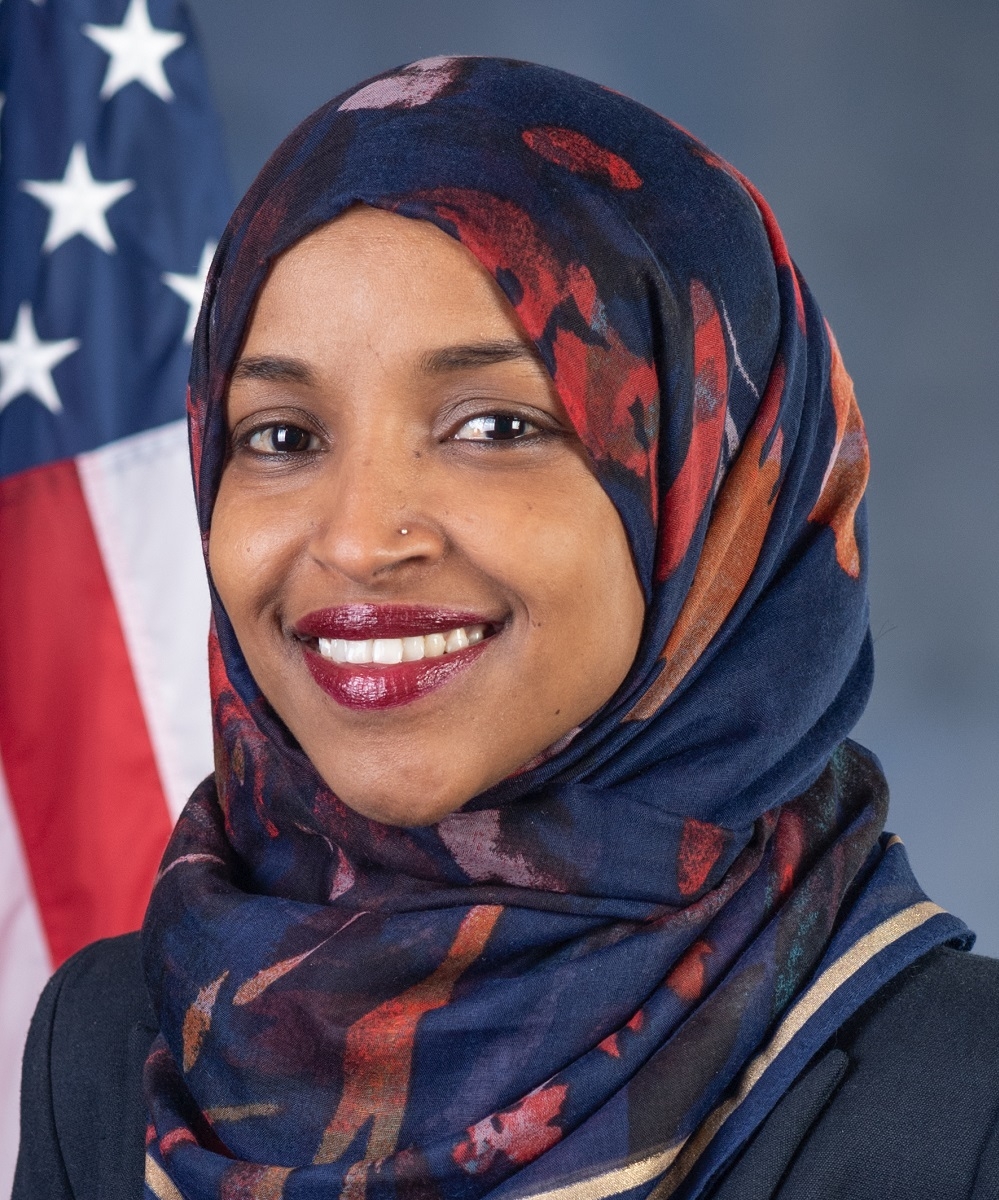
Image source: Ilhan Omar's Congressional office
Ilhan Omar is an American politician and activist who has made history as one of the first Muslim women to serve in the United States Congress. She was born in Somalia in 1982 and moved to the United States as a refugee in 1995, settling in Minneapolis, Minnesota. Ilhan began her career as a community organizer and activist working on issues such as education, healthcare and affordable housing.
Despite facing numerous attacks and threats, she has remained steadfast in her commitment to serving her constituents and fighting for a more just and equitable society. During the capital riots on January 6, 2021, Ilhan was one of the members of Congress who was targeted for harassment and violence by the mob of Trump supporters who stormed the Capitol building. In the aftermath of the attack, Ilhan spoke out forcefully against the insurrectionists and their enablers, calling for accountability and justice for those responsible. She also emphasized the importance of upholding the rule of law and protecting the democratic institutions that are the foundation of American democracy. Despite the trauma and danger of the situation, Omar remained resolute in her commitment to defending the Constitution and the rights of all Americans, and continues to be a leading voice for progressive values and policies in the U.S. Congress. (LA)
The Future: Muslim Women to Look Out For
12. Nandee Shabazz, Community Leader and Activist
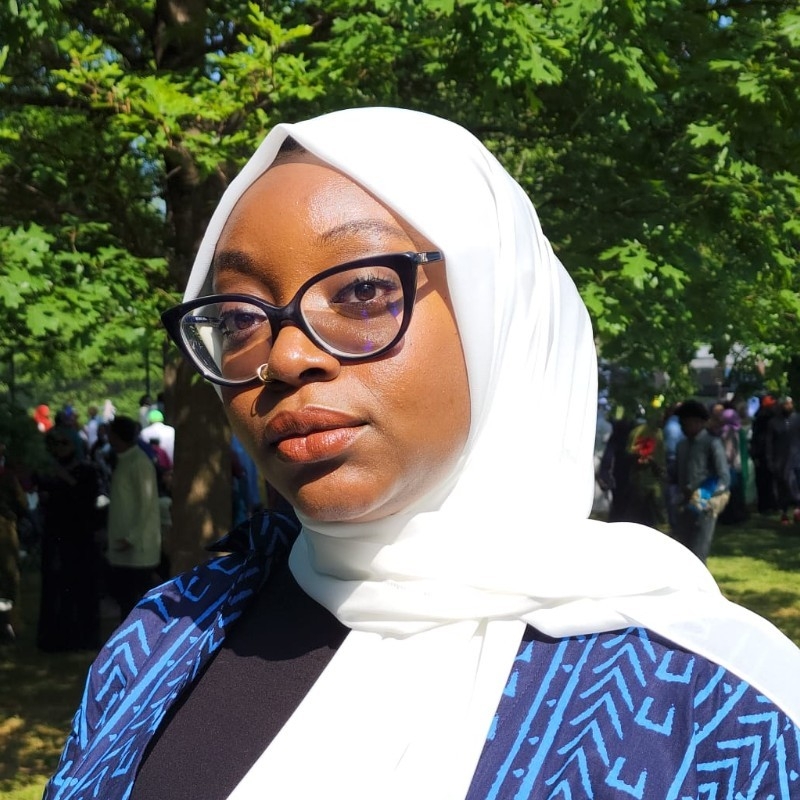
Image source: LinkedIn
Nandee Shabazz is a remarkable activist, and community leader known for her tireless efforts in advancing social justice and empowering marginalized communities through her work in organizations like the Council on American Islamic Relations and Dream Defenders. She holds a B.A. in International relations and political science and is currently a graduate student studying Public Policy.
Nandee is a graduate of Muslim Anti-Racisim Collaborative’s prestigious two-year American Muslim Anti-Racism Leadership (AMAL) Fellowship, a program that requires commitment and continual learning. “I am so honored to have the opportunity to learn and grow with Nandee,” says Muslim ARC executive director, Margari Aziz.
Nandee is an inspiring and dynamic speaker who conveys the passion of her work. She spoke at the Muslim American Society (MAS) Convention in December 2022, hitting the main stage before notable scholar Sh. Omar Suleiman. Nandee’s passion and dedication have made her a role model for many, and her influence has inspired others to follow in her footsteps. She firmly believes that everyone has the power to make a positive impact, and her work serves as a testament to the incredible things that can be achieved through hard work, determination, and a deep sense of compassion. (LA)
13. Dr. Mona Alyedreessy, Sociologist and Author
Dr. Mona Alyedreessy is a British Arab sociologist with a doctorate degree focusing on sociology in a religious context. Through her studies of Muslim converts and apostates, she focused her research on narcissism, spiritual, physical, mental and emotional abuse in Muslim communities that contribute to rising divorce rates and increasing cases of domestic violence and mental health problems.
For more than seven years, Dr. Alyedreessy researched narcissism and mental health within the context of Islamic psychology. Her goal was to assist struggling in healing and rediscovering their faith. She offers counseling and coaching and has written The Muslim Narcissist: An Islamic Guide to Understanding, Surviving and Healing from Narcissistic and Spiritual Abuse, an intensive guide that connects mental health issues and abuse with spiritual maladies that require healing.
The book addresses the issue of narcissistic abuse within the Muslim community, which can be particularly damaging due to cultural and religious factors. Dr. Alyedreessy uses Islamic teachings to provide a unique perspective on the issue and offer practical advice for those who have experienced narcissistic abuse. She also discusses the spiritual impact of narcissistic abuse and offers strategies for healing and recovery. (LA)
14. Sarah Ahmed, the POC Therapist
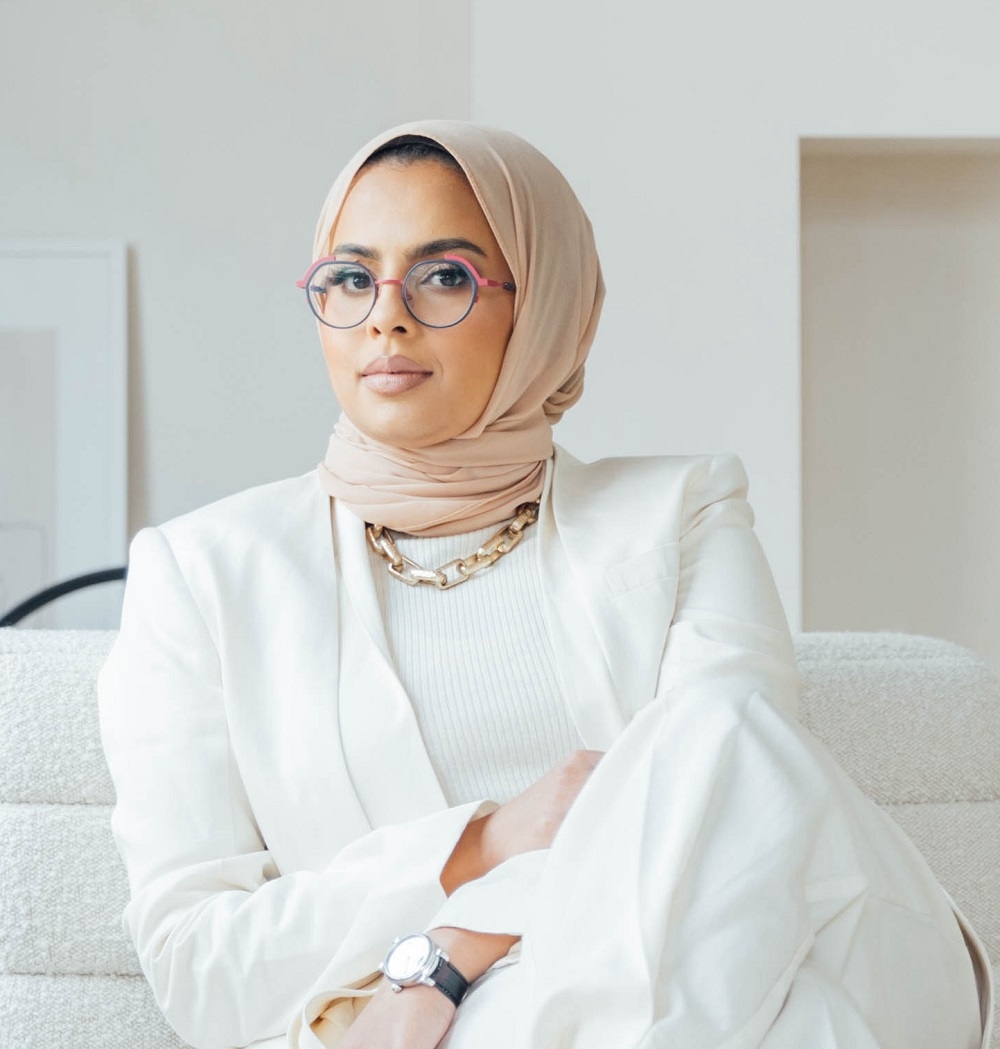
Image source: Instagram
Sarah Ahmed, known as the POC (person of color) Therapist, is a psychotherapist (and an HH Ambassador) doing crucial work through her practice and through her Instagram page to address a variety of issues from a much-needed minority perspective. She especially works hard in the area of teaching about boundaries to communities of color, “whether it be family, romantic relationships, workplace or with self – boundaries are a critical aspect to self care and mental health,” she says on her website. Sarah believes therapy isn’t a one-size fits all approach and is getting ready to launch “Leena,” the first BIPOC-focused mental health platform in Canada. (DDA)
15. Ruwa Romman, State Representative in Georgia
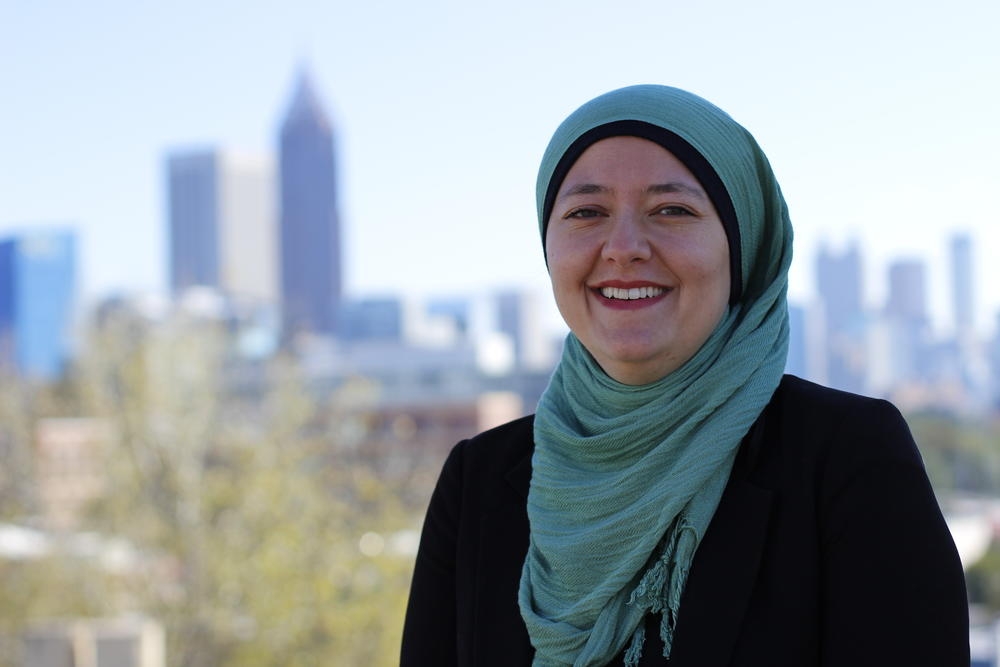
Image source: George Public Broadcasting
Over the years, we’ve had the pleasure of writing about numerous Muslim women seeking elected office across the country, many of these women being young community organizers who felt compelled to enter politics to fight for their constituents and the values in which they believe. Take Ruwa Romman, for example. Last year she became the first Palestinian-American elected representative in the Georgia state legislature (Democrat) at the tender age of 29 after 10 months of relentless campaigning. In this CNN article, she said, “I could write chapters about what I have gone through … All the times I am ‘randomly’ selected by TSA, teachers putting me in a position where I had to defend Islam and Muslims to classrooms being taught the wrong things about me and my identity… it colored my entire life.”
She said those challenges spurred her on into civic engagement, especially among marginalized communities. “Who I am has really taught me to look for the most marginalized because they are the ones who don’t have resources or time to spend in the halls of political institutions to ask for the help they need.” (DDA)
Muslim women's excellence is a testament to their unwavering determination and their limitless potential. Despite facing numerous challenges and obstacles, Muslim women have achieved remarkable success and continue to break barriers in their respective fields. They are leading innovation and transformation in their communities and challenging the patriarchal structures and norms that have traditionally limited their opportunities. Muslim women excellence celebrates the diversity and strength of Muslim women, and serves as an inspiration for future generations of Muslim women to pursue their dreams and reach their full potential.
Subscribe to be the first to know about new product releases, styling ideas and more.
What products are you interested in?


